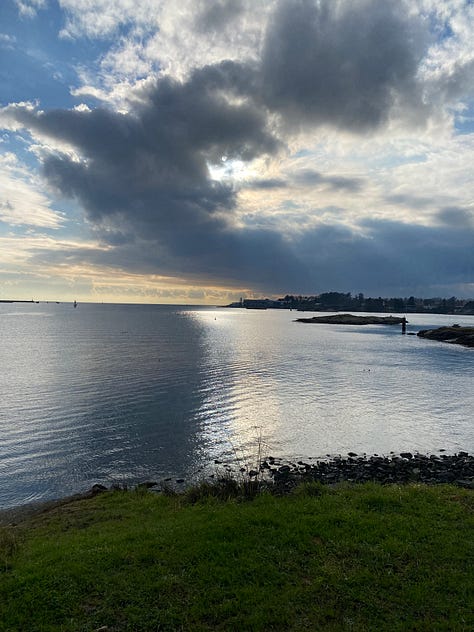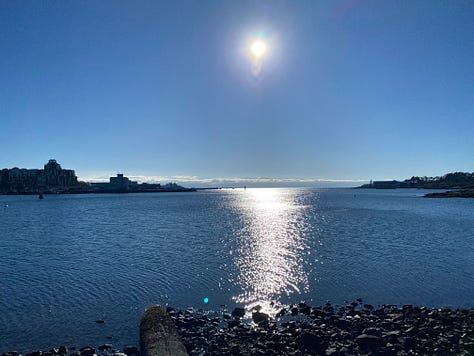All of Our Kith are Keening
And another eye for another eye till everyone is blind. ~Tommy Sands, There Were Roses
Ancestrally, indigenously, our kith included our lands as much as our people. Land, language, culture and people were known collectively and inseparably one from the other. In modern society we don’t hear about the land as much when we talk about our relations, our kin, if we even talk about relations at all. In many, if not most, indigenous ways of being on the earth the land/water/air, all beings, languages, cultural ways, the unseen and the living people, are all part of the whole and not separated. Equivalently, the whole is in each of these parts. I know from conversations with local First Nations Elders that this is true here on ləḱʷəŋən. When one part is hurting, everything, everyone is in pain. All of the kith keen.
For the word nerds…
Etymology of kith (n.)
Middle English kitthe "people, race, kinsmen, family," also "homeland, native region; kinship, relationship; knowledge, news; propriety, custom," from Old English cyðð "kinship, relationship; kinsfolk, fellow-countrymen, neighbors; native country, home; knowledge, acquaintance, familiarity," from cuð "known," past participle of cunnan "to know" (see can (v.)), from PIE root *gno- "to know."
The alliterative phrase kith and kin (late 14c.) originally meant "country and kinsfolk" and is almost the word's only survival in Modern English. Some cognates have evolved different senses, such as Dutch kunde "skill, competence," German Kunde "knowledge, news, tidings."
from: https://www.etymonline.com/word/kith
Etymology of keen (v.)
"lament loudly over the dead, bitterly wail," 1811, from Irish caoinim "I weep, wail, lament," from Old Irish coinim "I wail." Hence "to utter in a shrill voice" (1893). Related: Keened; keener; keening. As a noun from 1830.
from: https://www.etymonline.com/word/keen#etymonline_v_1797
Overlay that onto the catastrophes of conflict today. It depends where you look, but one source says there are “32 ongoing conflicts in the world right now, ranging from drug wars, terrorist insurgencies, ethnic conflicts, and civil wars.” Already, that’s a lot. Another site lists 114 armed conflicts in the world today. 114! I guess it depends on who is counting and how. To understate it ridiculously, it’s a lot, and especially considering there are only somewhere between 193 and 217 countries in the world. Yup. that’s not clear either. See this site. With either number, the wars-to-countries ratio is, um, high.
What I’m pointing to is that not one of us is left untouched by violence, by war, by hate, by retaliation. Here in this city, I know that the ləḱʷəŋən experience the ongoing, daily, impacts of genocidal systems and societal structures.
I admit. I don’t get it. I don’t get this drive to vengeance, retaliation, genocide and general violence. Hopefully, I’m not naïve or bypassing. I also get it. I too have felt the rise of the desire to harm someone, or hurt some other being, in myself as well. Occasionally, I’ve acted on that. I’m sorry. I’ll work to do better and make amends.
***
I often come back to this song by Tommy Sands, There Were Roses in times like these. (Have there been times quite like these before?) The song is about the conflict between North and South Ireland—between Catholics and Protestants. This line in particular keeps rolling around in my head:
And another eye for another eye till everyone is blind.
Is that where we’re going? Good God/Creator/Great Spirit/Gods, I hope not.
The song goes on to muse:
I don’t know where the moral is or where the song should end,
But I wonder just how many wars are fought between good friends,
And those that give the orders are not the ones to die,
It's Bell and O'Mally and the likes of you and I.
Here’s the whole song if you’re curious.
I don’t have answers to offer, morals to tout or great ideas about how to solve warring either. I don’t have enough specific understanding of each of these horrible situations to know what is really going on. I can only bring as offerings: a measure of poetry, ongoing grief, at bit of beauty and the willingness to sit with some tough, often koan-like, questions.
- How did it come to be like this?
- Why do we still think war will stop war? Why did we ever think war would stop war?
- What if it were those friends from the song who decided for or against conflict?
- What would happen if poets and artists were the ones to decide how to address conflicts?
Excerpt from The Poet VIII by Kahlil Gibran:
Until when shall the people remain asleep?
Until when shall they continue to glorify those
Who attain greatness by moments of advantage?
How long shall they ignore those who enable
Them to see the beauty of their spirit,
Symbol of peace and love?
Until when shall human beings honor the dead
And forget the living, who spend their lives
Encircled in misery, and who consume themselves
Like burning candles to illuminate the way
For the ignorant and lead them into the path of light?
Poet, you are the life of this life, and you have
Triumphed over the ages of despite their severity.
- What are we all so afraid of that we have to kill the thing we don’t understand?
- What is it about dualism that seems so attractive?
- Is fighting the easy out?
- If we’re all One, how did we become so divided and hateful to each other?
- Bayo Akomolafe asks a question in this way: “How do we pray, do we act, do we think, in ways that do not reproduce the conditions that nourish the dominant tendencies that have produced this war?”
- When did we start using our beliefs as weapons?
- Are we acting from ancestral wounds? Yes, many of us carry an ancestry of peoples who fought each other. For example, my great-grandmother Eleanor Frances Blackwall Evans was disinherited because she married a French man, Joseph Emilien Mairé. What wounds am I carrying from that epigenetically? Am I still acting from those wounds? Truth is, my warring ancestors also fell in love and had babies, so that’s the good news!
And, what is the 4th way here?
I once learned a practice that works to integrate two seemingly opposing views, ideas, thoughts, perspectives, whatever feels like an inner conflict.
Basically, you hold both palms up in front of you. On one palm you ‘place’ one of the pieces of the duality and describe it in detail—its texture, weight, colour, size, smell, shape, emotion, temperature—anything and everything you can use to describe how you experience it. On the other palm you do the same with the other piece in the duality. You settle into that and sense into what each of them feels/looks/smells etc. like. Then, only as slowly or quickly as it happens, you move you palms toward each other and then place your palms together in front of you as you sense, watch and feel them blend into a third thing. Take your time. Once that feels complete, you gently turn your palms, with the third thing in them, toward your chest and heart and slowly integrate that third thing wholistically into yourself. Like this:
That. That motion is the action that is the 4th way to come to the previously apparent duality, which is now integrated into the whole. It changes how you act. What is the action that arises from the integration of a previous duality.
What is the 4th way in a war?
***
Here’s one understanding I’m exploring… in a time when dehumanizing people is encouraged by leaders, when divisions are applauded and ‘sides’ are digging into their opinion trenches, it is my experience that honouring and developing an understanding about your own lands, all the beings there and your people, helps build empathy, compassion and curiosity in you. It anchors diversity in your communities anywhere. It helps transmit understanding to anyone you connect with about it. It hones discernment. It can lead to the restoration of peaceful ways to navigate through conflict and violence. It helps re-enliven or deepen gentle nuance, rich subtlety, beautiful complexity and multi-faceted ways of knowing. It helps you to notice, really stop to notice, the sacred nature of each other and all that is around you and part of you. It can help you to build strength and find mysterious sources of love.
Honouring and developing an understanding about your own lands, your own cultural ways and your own people can also provide a gentle holding place for grief, pain, shame and fear. I wrote a poem for my daughter who was heading to university years ago called Take It to the Stones. I meant it. I knew that the land, the stones, on her mountain-side school would help her, as would the cedars, the squirrels, the mycelia and the streams—the kith in that area. She did spend time with rocks, snow, soil and plants, as well as her studies. And she brought her kin in the form of a Celtic flag to honour her own ancestry. It did help her.
In part, it’s about intentions, I suppose. What do you want to lift up in the world? What would you like to be part of? How do you want to interact with and move through your life? If your attention was cash, how would you spend it? What ways of being do you want to feed? What are you doing to become a good ancestor?
***
Of course, I can say all this and share it with you calmly because most, not all, but most, of my own friends and family have the unearned good fortune of being out of war-harm’s way right now. At least as far as I know they are. Sometimes life is merciful.
So. These days, as I sit in the midst of the pain of conflicts everywhere, I’m aware of—in myself and so very many others, including the land and its beings—a collective keening; a worldwide wailing wall of pain, of grief, of the impossibility of understanding the scale of harm. We all belong here and each life is worthy of our grief and compassion. Because all of our kith are keening. And so are we.
Sending you all blessings for peacefulness and wisdom,
Nicole
MORE HERE: If you’re curious to explore more about honouring and tending your own lands, cultures, ancestors you can register or indicate your interest in these workshops: Write Your Roots and Handcestry: Co-Crafting Gatherings here.
Note: While it won’t be my focus generally, I couldn’t come back into the public eye without saying something about the general state of some of the realities in our dear, wee, precious world today. If you have comments to add below, I ask you to please be kind and gentle to each other and to me. Because, all of our kith are keening. And so are we.
#pilgrimagetobeauty pics for today. Three versions of the shoreline near here. Wonky horizons and all!









I so resonate with and appreciate what you've shared here, Nicole..I remember singing There Were Roses back in the days, as members of the same band, Celtic Spirit. I touched me then, and does, as much or more so, now. I believe it is by stopping and reflecting, as you have done in this piece, that we begin to open to, and feel into, how we and our kith are keening. It is a strange paradox that I'm often reminded of, that the keening goes on, and I wake up to realize I've been tuning it out. The opportunity then is to stop and let it all land in me...
Wise and thoughtful, Nicole. Every time I see a headline that ‘we will respond’ to the latest act of war, I shudder at how narrowly we define the ways we might respond.